

Viewpoints
Viewpoints is a blog in which different writers express their views and opinions on current topics. A new blog post is published about once every four weeks.
You can propose texts by e-mail to viestinta@kesko.fi. The maximum text length is 2,000 characters.
Real Christmas feeling
According to Wikipedia, a Christmas gift or present is an object given to a friend or relative at Christmas. The same source says that charity gifts, launched in Finland in 2005, make alternative or ethical gifts.
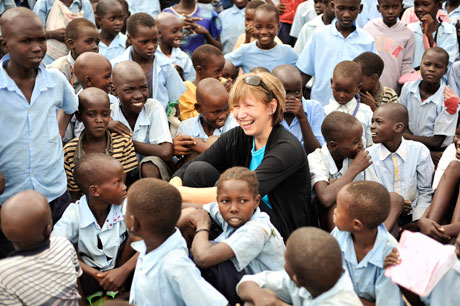
An ethical gift has already an established position as a present at Christmas time in particular. Such a gift is an appreciated option to be given to friends and relatives who already seem to have everything. It is also an ecological alternative in the exuberance of Christmas.
For myself, giving and receiving an ethical gift has always included a message indicating that the recipient is an important and special person who shares my thoughts and values. An ethical gift gives heart-felt joy for my friend and me, while providing, above all, real help for the child, the final recipient of the gift.
A UNICEF gift is unique in a sense that whether you donate a football, vaccination pack, mosquito net or water pump, UNICEF delivers the product wherever it is needed the most.
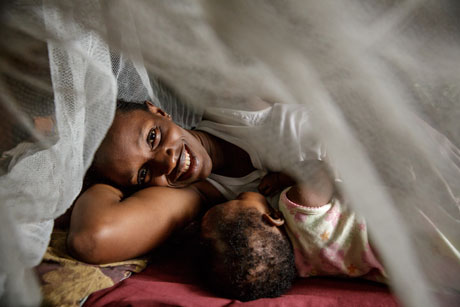
Issata Sow and her four-month-old daughter Davida Batu can rest undisturbed under a mosquito net in Freetown, the capital of Sierra Leone, in September. Picture: © UNICEF/SLRA2013-0288/Olivier Asselin
This year your gift may, for example, go to the Philippines, where more than five million children suffer because of the destruction caused by the typhoon. They need clean water, food, medicines and school supplies in order to stay alive and continue with their normal lives.
Or your gift may end up to the children who have been affected by the Syrian war and whose lives are in danger when the winter comes. Together with its partners, UNICEF delivers emergency supplies to Syria and nearby areas to keep children healthy. In addition to winter clothes, Syrian children need blankets and toiletries.
A UNICEF gift adds to your Christmas a feeling that you have given one child the most important present in the world. That somewhere in this world a small child with his or her siblings can go to sleep under a mosquito net donated by you, feeling safe. They have learned that the net protects against mosquitos spreading malaria. Now they are able to sleep undisturbed, just like any child should. And you and your friend will have a real Christmas feeling.
You can buy a UNICEF gift at www.uniceflahja.fi and at sales points of local UNICEF groups throughout Finland. There are 23 gift options in all, from a five euro football to a 392 euro water pump. Companies can also present their important customers and stakeholders with a gift that is not useless. When a company makes a donation through us, a child or family in need of help gets a gift which cannot be measured in money. Further information (in Finnish) at www.unicef.fi/fiksulahja .
Writer is Marja-Riitta Ketola, Executive Director of UNICEF Finland.
K-retailers and Kesko as responsible employers
Last year was the K-Group’s 100th anniversary year. As part of its celebration, K-retailers and the K-Retailers’Association initiated cooperation with the Finnish Association on Intellectual and Developmental Disabilities (FAIDD). The project, dubbed “Many Kinds of Performers”, was aimed to offer paid employment to people with disabilities who are easily excluded from the open labour market. Disabled people and people with partial work disability are not equal with other job seekers although discrimination is against the law. Disabled people need work coaches to support and help them in work related matters.
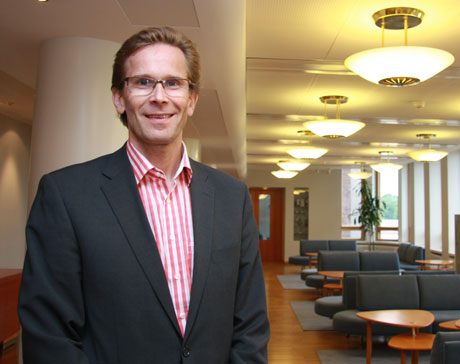
In the project, a work coach was hired in FAIDD to facilitate K-retailers and disabled people willing to take a job meeting each other. The recruitment of a person with a disease or a disability is carried out in cooperation with TE-services (Employment and Economic Development Services), Kela (the Social Insurance Institution of Finland), social services/disability services, work coaching and tax administration. Employment easily becomes a bureaucratic jungle of different application forms and practices varying between different parts of Finland.
The work coach of the project acted as an ”information centre” between all parties in order to make employment as smooth as possible. Unfortunately in practice, the other side of the coin became visible: although the employer was ready to hire a particular person, bureaucracy sometimes delayed the process so long that in the end, employment did not take place.
Obstacles bigger than bureaucracy in the employment of people with disabilities are attitudes which K-retailers began to tackle. The project was not carried out with emphasis on disability. Instead, a suitable recruit with the right attitude, willingness to be employed and to be part of the K-Group was sought for a job on offer. Thanks to the project, 27 people with disabilities found a permanent or a fixed-term paid employment in a K-store.
In Finland, around 350 people with disabilities are working in paid employments in different fields and the number has remained unchanged for many years. In slightly over a year, the active and unprejudiced approach of K-retailers enabled a substantial rise in that number. The professional work coach also played a significant part in the successful outcome.
Today, finding a job is not easy whether you have a disability or not. Youth unemployment is afflicting the whole of Europe, not least in Finland, where the continuously rising youth unemployment rate is really worrying: at present, around 40,000 young people between 15-24 years of age are without a job.
Encouraged by the project “Many Kinds of Performers” Kesko and K-retailers joined the Youth Guarantee effort by launching a project of their own as part of the K-Group’s responsibility work. The project is based on the same operating model as in employing people with disabilities but with a wider scope of options. For example, wage-subsidised work, trial work, apprenticeship and recruitment specific training are employment alternatives included in the K-Group’s Youth Guarantee.
The project hired a coordinator to communicate information to Kesko supervisors and K-retailers on the ways in which young people can be employed by the K-Group and the forms of support available for that purpose. In addition to information, the project is supported by the K-Group spirit, responsibility and willingness to employ young people.
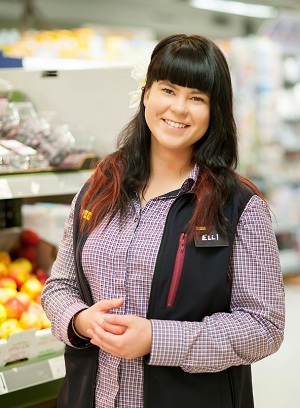
Elli Mäki was employed with the help of the Youth Guarantee project and she works at K-market Himanka.
Photo: Henri Sikkilä
The writer, Ari Svensk, is Kesko’s Vice President for Human Resources and Managing Director of K-instituutti Oy.
 This article is part of the Finnish Government’s Working Life 2020 project aimed to make Finnish working life the best in Europe by 2020.
This article is part of the Finnish Government’s Working Life 2020 project aimed to make Finnish working life the best in Europe by 2020.
Behaviour change – the untapped opportunity for consumer business
A research conducted by the British communications agency Futerra found that 80 per cent of business leaders expect sustainable lifestyles to be key drivers of business growth over the next few years. The demand for different products and services which change behaviour is growing rapidly. More than fifty leaders of global consumer market businesses were interviewed in the research.

One of the research authors compares the current change in consumer business to the gold rush in America at the turn of the 20th century. In the long term, the biggest financial benefits were not gained by the gold miners but people like Levi Strauss, who was quick to realise the significant and sustained need for a new consumer product – in this case, work trousers.
The result of Futerra’s research opens a new perspective on sustainable business operations. Over the last decades, sustainability has mainly referred to the fast growing cleantech market and innovations improving energy and resource efficiencies. Related investments have produced anything from A++ energy rated household appliances to hybrid cars and contracts for the supply of solar or wind generated power.
The problem is not demand but supply
Despite undeniable achievements, technical energy efficiency improvements have not helped slow down climate change or make lifestyles more sustainable. The latest research evidence on climate warming can be found in the Fifth Assessment Report (AR5) of the Intergovernmental Panel on Climate Change (IPCC) published last week (click here for the summary). It contains harsh facts about the progress of climate change and its impacts on ocean warming, for example, which is taking place considerably more rapidly than estimated. The third part of the assessment report to be published next year will discuss means towards changing the course. For the first time, these means include behaviour change – in other words, a shift towards more sustainable lifestyles.
In this context, behaviour change refers to making sustainable lifestyle choices easy and attractive to people with the help of new products and services. At least a lack of demand is not a barrier to the emergence of such markets. This view, shared by the business leaders interviewed by Futerra, is supported by numerous value and attitude surveys according to which people in the western world, especially Finns, are concerned about the state of the environment and the impacts of their personal choices on it.
The problem is not demand but supply. Today, the most environmentally friendly products are tailored to customers who prioritise the ecological aspects of products and services above all others. These so-called econiche consumers represent no more than one tenth of all market potential.
Who are the future Levi Strausses?
Last year, Demos Helsinki developed four scenarios presenting pathways for reaching the other customer segments as part of the European social platform project SPREAD Sustainable Lifestyles. The project participants consisted of a wide variety of businesses (incl. Ikea and Henkel) as well as well-known European research institutes.
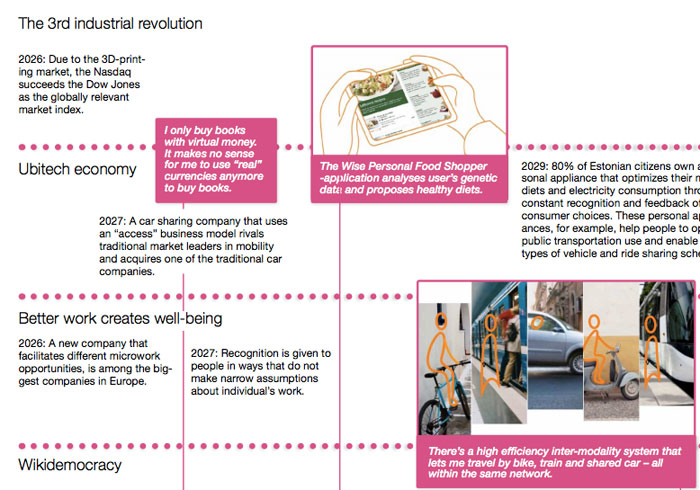
Perhaps the most interesting scenario for the trading sector is the one which describes sustainable lifestyles in a society where technology and global networks enable a more varied use of citizens’ competencies. Various platforms enabling co-creation coupled with sharing services become more common and increase the number of service providers like Airbnb, doing business by leveraging underutilised resources. There is an abundance of such companies and depending on the situation, customers may become service providers and vice versa. A rich service economy enables the adoption of sustainable lifestyles with, for example, more flexible transfer from one location to another without a car, it opens up the market for peer-to-peer transportation and makes goods lending easy.
In the Gold Rush days of America, the biggest winners were not gold miners but those who knew how to offer services to meet the needs in changing circumstances. The Levi Strausses of the future may be businesses which identify network possibilities in leveraging consumer competencies in different ways from product development to distribution. These companies will learn how to generate added value through different sustainable products and services to people most of whom are not yet reached by the market.
The writer Maria Ritola is a researcher with years of experience in the development of business models emerging from megatrends with consumer market companies. Ritola is Leader of Sustainable Economy at Demos Helsinki.
World Green Building Week now also in Finland
From 16 to 20 September 2013, the World Green Building Week will run in 98 countries throughout the world. The campaign events and info sessions highlight sustainable, productive and comfortable built environments.
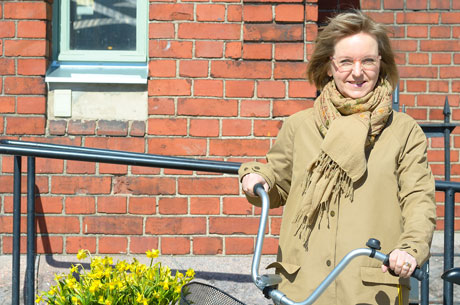
Heli Kotilainen, Managing Director of Green Building Council Finland
The week presents, for example, new sustainable urban quarters and hospital buildings in Germany. In Australia, an urban orienteering route takes participants on a tour around environmentally certified features. The Museum of London presents their environmental projects and beehive, and the United Arab Emirates their green hotel.
Throughout the week, Green Building Council Finland provides information about built environment projects and events organised under the themes of home, school and office. We also arrange a miniseminar on the significance of office lighting in respect of energy saving but also workplace comfort and productivity, we go to see and hear bout Nokia’s office premises and new working methods. Friday is the National Teleworking Day organised by the Finnish Environment Institute (SYKE) and Microsoft for reducing commuting emissions and hours.
With small everyday actions we can influence not only the state of the environment but also our own wellbeing and finances. The theme week makes us think about the small things which have a big impact.
Housing generates 30% of households’ greenhouse emissions, which means that housing styles are important with regard to the environment but also to housing costs. Office space solutions and new working methods can decisively reduce energy consumption and costs and increase workplace comfort when correctly implemented. Schoolwork practices, recycling of materials and engaging pupils in sustainable use of schools generate savings and build community spirit. Multipurpose use of school premises increases efficiency, which reflects in lower needs to invest in new buildings. These are examples of everyday actions with which we can influence environmental efficiency, our comfort and health.

Read more about the theme week and sustainable everyday actions at: http://figbc.fi/wgbw/
Green Building Council Finland is an association which promotes the sustainability of built environment in Finland and as part of an international network www.figbc.fi. The writer Heli Kotilainen is the Managing Director of Green Building Council Finland.
Fairtrade success story continues
Fairtrade Finland celebrates its 15th anniversary this year. At the time of its foundation, there were many who saw the initiative as merely an interesting but marginal detail in the mainstream of trade. Nevertheless, small has become big: already last year, the sales of Fairtrade products in Finland valued at over €150 million. Fairtrade enjoys a recognition rate of 93% among Finnish people.
The strong position of Fairtrade is the result of cooperation among a comprehensive number of different sectors of society. Its success would not have been possible without the strong support from civil society, companies, trade unions, ecclesiastic circles, decision-makers and individual consumers.
Numerous surveys conducted by external operators have shown the benefits Fairtrade generates for farmers in developing countries and independent comparisons have proved it to be the most comprehensive and the most ambitious ethical certification. Today, Fairtrade provides benefits for more than 1.2 million small farmers and workers on large farms with their families and communities.
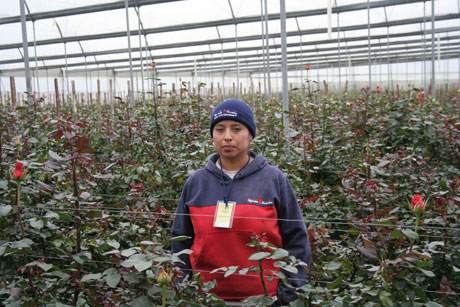
Farm worker Guadalupe Cunalata at the Ecuadorian Nevado rose farm, from where the 50 cm Pirkka Fairtrade roses, for example, are imported.
In practice, the effects of the work extend even further, as the success of Fairtrade has played a significant part in bringing out responsibility issues on a wider scale. We have shown that ambitious, ethical trade can be part of the mainstream and profitable business. As a result, responsibility objectives have been set higher even in areas where Fairtrade itself is not active. The bigger benefits Fairtrade channels to developing countries, the stronger example it also sets outside its own sphere of direct influence.

Our work is not done yet. Although growth has been fast year after year, most producers in developing countries growing different products for Finnish consumers still remain outside Fairtrade. Therefore, Fairtrade must continue its expansion even after our 15th anniversary celebration.
At the same time, Fairtrade has to maintain its position as the most ambitious certification in its sector, and growth shall not be sought by undermining the benefits channelled to farmers. The best way to ensure sustainable growth is that farmers and farm workers themselves take part in the decision making concerning the requirements set to production and trade. In this respect too, the future looks promising, because farmers and farm workers were recently given half of the voting power within the Fair Trade movement.
The writer is Fairtrade Finland's Executive Director Janne Sivonen.
Organic production is transparent
Consumers are increasingly interested in what they are eating. In addition to the taste, smell and look, consumers need information about things in which they cannot rely on their senses only when making a choice.
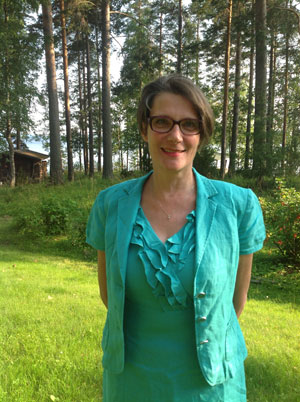
Consumers' thirst for knowledge requires transparency across the entire food chain. When consumers want to know where and how food ingredients have been produced, it also serves to highlight all the work done to provide good food and to reveal if, in consumers' opinion, shortcuts have been taken on the route towards good eating.
From the viewpoint of organic production, there is nothing new in this. The origins of organically grown food lie in the common wish of producers and consumers to have pure food and other commodities, produced ecologically and taking animal welfare into account. The production method has been written down in the rules of organic production for everyone to see and assess. When buying organic food, consumers know what they will be eating and how it has been produced.

In the European Union, the organic food production method is prescribed by law. Unfortunately, what has been gained by the accuracy of the text has been lost in its clarity. The EU regulation on organic production cannot be used for in-store communications but it accurately sets out the minimum requirements which every organic product sold in the EU has to meet. Organic production is the only food production method for which as comprehensive international understanding and legislation as this has been created. The rules concerning organic production are also monitored. In Finland, monitoring is carried out by the authorities, who visit all organic farms and companies manufacturing, packaging and importing organic food at least once a year.
The rules and the monitoring processes involved provide a guarantee of transparency and, at the same time, of traceability, in spite of the fact that they sound and may feel tiresomely bureaucratic if they happen to concern you. Even though the rules and monitoring of organic production leave room for improvement, there is much to learn from them when increasing the transparency of conventional food production.
It is great that consumers want to know more about food. Knowledge turns consumers into masters who can, besides people close to them, also influence the welfare of the environment and animals. Let's work together to have a transparent plate.
Writer Marja-Riitta Kottila is the Executive Director of Pro Luomu, the Finnish Organic Food Association.
Developing partnership
A good partnership can be compared to any good relationship. It is based on open communications and a genuine desire to work together. It has been said that a demanding partner is the best possible motivation to enhance operations. Therefore it is important that both of the parties also take up and discuss difficult issues which may become obstacles to cooperation. In a good partnership, both parties learn from each other. A partnership between a small and a large operator may also work well; an example of this is the cooperation between Pielispakari and Kesko Food.
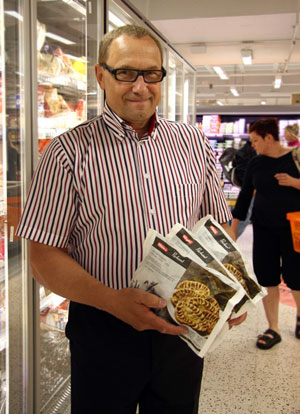
Pielispakari Oy started as a bakery in a garage back in 1993 and has since been built and grown step by step: from a local to regional and from a regional to a nationwide operator.
An important phase in the history of the company took place in 2005. This marked the start of our nationwide cooperation with Kesko Food, when the Pirkka Karelian pasty range that consists of three products was created. The pasties and their innovative packaging are a result of our cooperation and now the genuine traditional products in modern packaging are sold across Finland. They gained an honorary mention in the Start Product of the Year contest, but what is more important is the warm welcome received from consumers.
The fruitful and inspiring cooperation with Kesko Food's Product Research Unit and the persons responsible for purchasing has continued since. The most recent result of our product development is a range of nationwide in-store bakery products; the group which has been constantly increasing its share of total bakery sales.
It's great that regional and local food traditions are highlighted in Kesko Food's marketing. As we have big nationwide operators in addition to representatives of local and versatile bread culture, getting regional products on store shelves has proved challenging, at least at an early stage. I believe that by increasing discussion between bakeries and the persons responsible for regional purchasing, local special products will gain more visibility in the bakery departments of stores. The cooperation model in the development of Pirkka products serves here as an excellent example.
I firmly believe that traditional bread and other bakery products will continue to have an important place on Finnish tables. We at Pielispakari want to work with this in mind every day, by developing our partnership.
Writer Erkki Timonen is Managing Director of Pielispakari Oy.
Getting ourselves into a good mood – by blundering, if nothing else
There is a constant flow of bad news through the media about crises, restructurings, stress and bullying. It can even make us believe that we cannot influence our destinies in any way, because Somebody Else is leading us like a navigator. This, in turn, easily leads to passivity, sickness and even acquired helplessness.
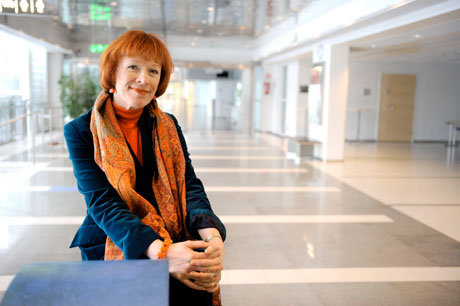
That is not in anybody’s best interest. Every one of us can contribute through daily actions, which only takes an effort. Feelings are contagious, which is why we should pay attention to what kind of moods we express.
It is important that we reinforce positive feelings, because according to research, they also widen our perception, enable creativity and even contribute to our health. They enable us to see the forest for the trees and focus on the essential. At the same time, our employers will benefit from the improvement in our performance.
We should put our heads together at the workplace and think how to develop pleasure at work. Could we perhaps highlight great moments with customers, make a habit of praising our colleagues and start positive gossips behind their backs? What could we be grateful for? Why not reveal our most embarrassing blunders to each other so that they would not be repeated?
A good number of times I’ve put people into a good mood telling them about my visit in a hypermarket where I didn’t find a sales assistant in the paints department. There was a notice on the wall advising customers to call a sales assistant using the phone on the left at the back of the store. I looked and looked for it, but I only found a green button with a running stick figure on it. I pressed the button and immediately knew that I had made a mistake. An alarm siren went off and a crowd of sales assistants and guards emerged behind the rear wall asking what had happened.
I had to confess that it had been me. ”Can’t you tell the difference between a phone and a button,” one of the sales assistants asked me. “I’m only a professor,” I answered. If nothing else, I got immediate service, but not the paint I wanted. And what’s more, I failed to do any grocery shopping, because I was embarrassed and couldn’t concentrate for all the alarms that wouldn’t stop. Not until I got into my car did I burst into laughter.
Marja-Liisa Manka, D.Phil., M.Soc.Sc., is a Research Director and Professor at The Research and Education Centre Synergos of the School of Management at the University of Tampere. She is the Social Science Professional of the Year 2011 and was awarded as the Advocate for a Good Working Life in 2011 by the Työ Terveys Turvallisuus magazine of the Finnish Institute of Occupational Health, FIOH.
Reduce your carbon footprint from housing
Approximately 30% of Finland’s carbon footprint comes from real estate. Property structures, technology and automation can save 20% of energy consumption, which contributes to a smaller carbon footprint. The biggest impact, however, comes from human activities, from how we live and use our properties.

- Choose low flow water fixtures and avoid excessive water use.
- Internal temperature has a major impact on carbon footprint. Reduce the home temperature at least while you are away.
- Make sure that systems operate as intended. Do not cover radiators or radiator valves with furniture or curtains.
- Do not cause unnecessary need for heating. Give the house an effective but quick airing; do not leave windows ajar for the day.
- The sauna stove is by far the biggest energy consuming appliance among domestic electrical equipment. Heat the sauna for the whole family at a time and maintain temperature at 70-80°C.
- Make sure that the storage temperatures of your refrigerator and freezer are appropriate. Allow foods to cool in advance and do not overload the appliances.
- Be sure your dishwasher is full when you switch it on and avoid pre-rinsing with running water.
- Switch off the television and any auxiliary appliances. If left on stand-by, they consume nearly as much electricity as the cold storage equipment annually.
- It is easy to save electricity in lighting. Switch off lamps when lighting is not needed.
- Buy electricity produced using renewable energy and monitor your energy consumption with the help of reports provided by the electric company.
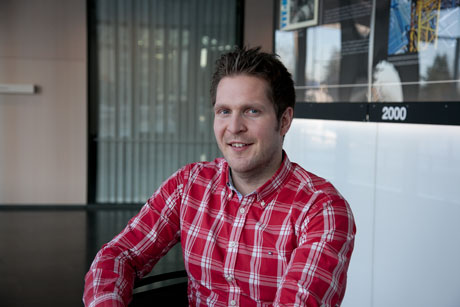
In picture: Tomi Mäkipelto
Making a habit of these things is not difficult and they easily become routine.
Constructors play a significant part in the reduction of the carbon footprint from real estate. New homes are more environmentally friendly than old ones. However, it is the consumer who makes the decision between an energy efficient house and a house built in accordance with standards. And regardless of the type of the property, the way it is used is always important.
The writer is Tomi Mäkipelto, Vice President, Energy, YIT Corporation.
Consumers must be able to trust country-of-origin labels for food products
Country-of-origin labels for food products have been a major topic of discussion at the beginning of the year. It is important that consumers be able to trust product information. Finnish grocery stores work continuously to promote openness also in long food chains, and consumers, too, can make a difference.
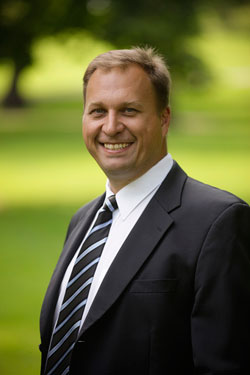
Stores want to provide consumers with the information obtained from food suppliers and the manufacturing industry. The more information is provided, the better. The use of horse meat masquerading as beef, which is being investigated by the police, is nothing short of fraud. It is extremely important for grocery stores that the matter be sorted out and prevented from happening again.
Grocery stores strive to ensure the safety of products and the accuracy of information as best they can. Legislation, product testing and traceability, among other things, are taken into account. Stores carry out thousands of quality assurance tests every year and work in close cooperation with customs. This guarantees that most suspicious products never reach the shelves. If, however, Kesko becomes aware that a product on the market is unsafe or misleading for the consumer, a product recall is made.
Consumers can make a difference with their choices
Quality systems, i.e., product certification, help ensure product conformity. Voluntary labelling systems, such as the "Food from your own country" label, and EU name protection systems guarantee that the origin of products is known. The Lappish almond potato (Lapin Puikula) is an example of a product with protected designation of origin. Consumers may also choose from other name-protected products.
As regards products to be sold at the service counter, the store personnel are able, if necessary, to find out the origin of the raw materials of products such as salads and convenience food. The origin is always indicated for fish and beef to be sold at the service counter (already mandatory by law for beef). The information of other products is also available on their price labels or on the store's notice board – if there is enough space for it.
Therefore, stores and consumers can rest assured about quality levels and information reliability – for both domestic and imported products. Although this procedure cannot guarantee full protection, for example, against frauds like the horse meat scandal or other criminal activities, it ensures quick reaction in these problem situations. This has also been proven by the swift actions of companies and authorities during the horse meat scandal.
Author: Kari Luoto, Managing Director of the Finnish Grocery Trade Association